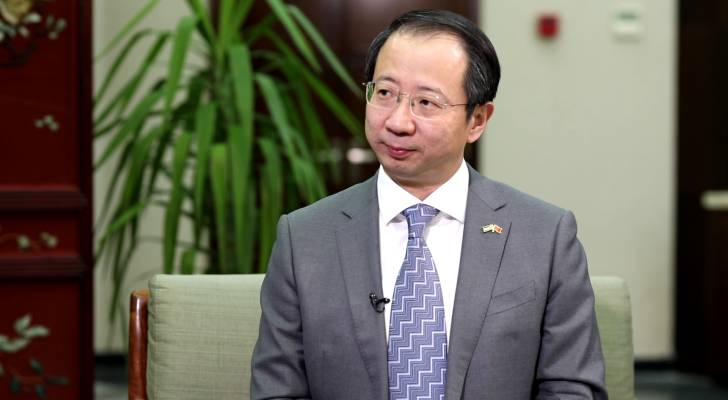Chinese Ambassador to Jordan H.E. Chen Chuandong.
China ready to “fight until the end” against US tariffs: ambassador
Amid escalating trade tensions between the United States and China, Chinese Ambassador to Jordan, H.E. Mr. Chen Chuandong, has criticized the US imposition of tariffs as a violation of international trade norms, calling them “economic bullying” and a “serious attack” on the global multilateral system.
Speaking in an exclusive interview with Roya, ambassador Chen stated that “the United States is using tariffs as a weapon, attacking all countries indiscriminately, including China,” and labeled such actions as a breach of World Trade Organization (WTO) rules. In response, he said, China has taken “legitimate and forceful countermeasures.”
“We don’t want to fight, but we’re not afraid of fighting. If we have to fight, we’ll fight till the end,” he emphasized, while calling for global opposition to unilateralism and trade protectionism.
Ambassador Chen underscored China’s economic resilience, noting that US tariffs now affect only 14.7 percent of China’s total exports.
“China is no stranger to trade wars. Even back in 1927, the US imposed tariffs on China,” he recalled.
To offset the pressure, China is expanding domestic consumption, opening its markets further, and investing in industrial upgrading.
Initiatives such as government subsidies, vocational training, and relaxed investment restrictions are part of what he called a robust plan by China to stabilize the economy.
WTO and dialogue: China’s legal route
Despite the tensions, Ambassador Chen insisted that China remains committed to the WTO system. “We filed a case against the US tariffs, and the US accepted consultation under WTO mechanisms. We are pursuing our case through proper legal channels,” he said.
When asked about the absence of high-level talks between Washington and Beijing, the ambassador dismissed recent American media reports of backchannel negotiations as “fake news.”
“We are open to dialogue, but only on the basis of mutual respect and equality. Threats and blackmail are not the way to talk to China.”
Diversifying
The ambassador highlighted that rather than isolate China, US tariffs are pushing it to build new trade relationships. He pointed to the Belt and Road Initiative (BRI), which now accounts for over half of China’s foreign trade. China, he said, is “the top trading partner for nearly 150 countries and regions.”
Turning to Jordan, Ambassador Chen said the two countries share a “strategic partnership” with “highly complementary economies.” He noted that Jordanian exporters and Chinese investors in Jordan’s industrial sector have both been affected by US tariffs.
He also reaffirmed China’s openness to Jordanian products and investments, suggesting that both sides stand to benefit from stronger trade ties.
Global stand-off
Responding to the idea that US measures are meant to curb China’s rise, Ambassador Chen dismissed the notion that China seeks to challenge the United States on the global stage.
“Our purpose is to have better lives for our children, we’re not taking over the US as a world cop or a so-called leader that would dictate every country.”
Citing China’s history as a trading nation, the ambassador said Beijing’s approach is grounded in cooperation, not confrontation.
“China built the Great Wall to defend itself from aggression. It is not in our DNA to have occupation or colonialism against other countries.
“We have been a trading nation throughout our history.”
“These two great countries have to live in peace and harmony for their benefit and the world’s benefit.”
In response to intensifying US tariffs, China is relying more heavily on its “double circulation” economic strategy to reinforce resilience and maintain stability. The ambassador emphasized that the approach centers on strengthening the domestic market while remaining open to global trade.
"Our strategy is to have what we call double circulation: internal circulation and also external circulation. And these two kinds of circulations complement each other."
"No, not at all," Ambassador Chen responded when asked if China's focus on boosting its local economy signified a move towards protectionism. "Our strategy is to have what we call double circulation: internal circulation and also external circulation. And these two kinds of circulations complement each other."
He elaborated that internal circulation involves enhancing domestic demand and consumption, aiming to create a unified and efficient domestic market.
"In China, unfortunately, we still have local protectionism in some cases, some of our markets are fragmented," he noted. "So what we're trying to do is that we have a stronger and unified market, so all the forces for production, all these factors, will be utilized in the best way."
Simultaneously, external circulation pertains to China's continued commitment to opening up to the global market.
"We believe that by opening up, we can build our economy stronger," Ambassador Chen stated. "If you look at China's trajectory, our growth has been coupled with our opening up to the world."
He emphasized that reform and opening up go hand in hand in China's development model. "In China, when we say reforms, we always say reforms and opening up to the world. So that goes hand in hand," he said.
"So we're not closing the country, but rather we're opening wider to the world,” the ambassador concluded.




